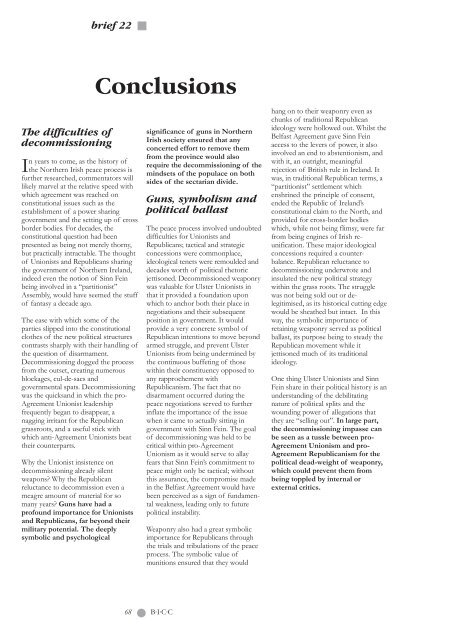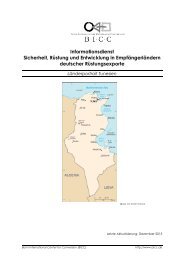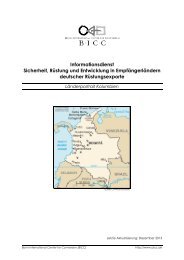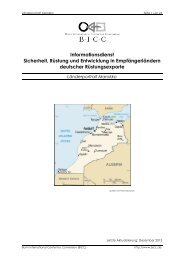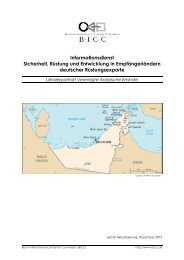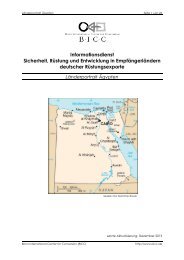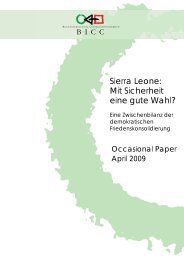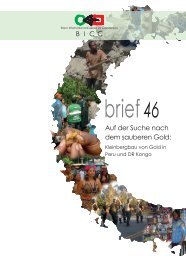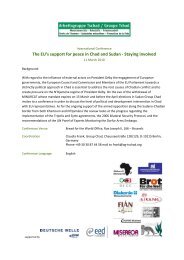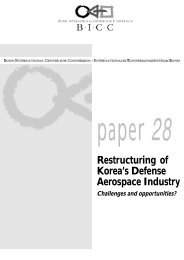English - BICC
English - BICC
English - BICC
Create successful ePaper yourself
Turn your PDF publications into a flip-book with our unique Google optimized e-Paper software.
ief 22<br />
The difficulties of<br />
decommissioning<br />
In years to come, as the history of<br />
the Northern Irish peace process is<br />
further researched, commentators will<br />
likely marvel at the relative speed with<br />
which agreement was reached on<br />
constitutional issues such as the<br />
establishment of a power sharing<br />
government and the setting up of cross<br />
border bodies. For decades, the<br />
constitutional question had been<br />
presented as being not merely thorny,<br />
but practically intractable. The thought<br />
of Unionists and Republicans sharing<br />
the government of Northern Ireland,<br />
indeed even the notion of Sinn Fein<br />
being involved in a “partitionist”<br />
Assembly, would have seemed the stuff<br />
of fantasy a decade ago.<br />
The ease with which some of the<br />
parties slipped into the constitutional<br />
clothes of the new political structures<br />
contrasts sharply with their handling of<br />
the question of disarmament.<br />
Decommissioning dogged the process<br />
from the outset, creating numerous<br />
blockages, cul-de-sacs and<br />
governmental spats. Decommissioning<br />
was the quicksand in which the pro-<br />
Agreement Unionist leadership<br />
frequently began to disappear, a<br />
nagging irritant for the Republican<br />
grassroots, and a useful stick with<br />
which anti-Agreement Unionists beat<br />
their counterparts.<br />
Why the Unionist insistence on<br />
decommissioning already silent<br />
weapons? Why the Republican<br />
reluctance to decommission even a<br />
meagre amount of material for so<br />
many years? Guns have had a<br />
profound importance for Unionists<br />
and Republicans, far beyond their<br />
military potential. The deeply<br />
symbolic and psychological<br />
Conclusions<br />
significance of guns in Northern<br />
Irish society ensured that any<br />
concerted effort to remove them<br />
from the province would also<br />
require the decommissioning of the<br />
mindsets of the populace on both<br />
sides of the sectarian divide.<br />
Guns, symbolism and<br />
political ballast<br />
The peace process involved undoubted<br />
difficulties for Unionists and<br />
Republicans; tactical and strategic<br />
concessions were commonplace,<br />
ideological tenets were remoulded and<br />
decades worth of political rhetoric<br />
jettisoned. Decommissioned weaponry<br />
was valuable for Ulster Unionists in<br />
that it provided a foundation upon<br />
which to anchor both their place in<br />
negotiations and their subsequent<br />
position in government. It would<br />
provide a very concrete symbol of<br />
Republican intentions to move beyond<br />
armed struggle, and prevent Ulster<br />
Unionists from being undermined by<br />
the continuous buffeting of those<br />
within their constituency opposed to<br />
any rapprochement with<br />
Republicanism. The fact that no<br />
disarmament occurred during the<br />
peace negotiations served to further<br />
inflate the importance of the issue<br />
when it came to actually sitting in<br />
government with Sinn Fein. The goal<br />
of decommissioning was held to be<br />
critical within pro-Agreement<br />
Unionism as it would serve to allay<br />
fears that Sinn Fein’s commitment to<br />
peace might only be tactical; without<br />
this assurance, the compromise made<br />
in the Belfast Agreement would have<br />
been perceived as a sign of fundamental<br />
weakness, leading only to future<br />
political instability.<br />
Weaponry also had a great symbolic<br />
importance for Republicans through<br />
the trials and tribulations of the peace<br />
process. The symbolic value of<br />
munitions ensured that they would<br />
68 B·I·C·C<br />
hang on to their weaponry even as<br />
chunks of traditional Republican<br />
ideology were hollowed out. Whilst the<br />
Belfast Agreement gave Sinn Fein<br />
access to the levers of power, it also<br />
involved an end to abstentionism, and<br />
with it, an outright, meaningful<br />
rejection of British rule in Ireland. It<br />
was, in traditional Republican terms, a<br />
“partitionist” settlement which<br />
enshrined the principle of consent,<br />
ended the Republic of Ireland’s<br />
constitutional claim to the North, and<br />
provided for cross-border bodies<br />
which, while not being flimsy, were far<br />
from being engines of Irish reunification.<br />
These major ideological<br />
concessions required a counterbalance.<br />
Republican reluctance to<br />
decommissioning underwrote and<br />
insulated the new political strategy<br />
within the grass roots. The struggle<br />
was not being sold out or delegitimised,<br />
as its historical cutting edge<br />
would be sheathed but intact. In this<br />
way, the symbolic importance of<br />
retaining weaponry served as political<br />
ballast, its purpose being to steady the<br />
Republican movement while it<br />
jettisoned much of its traditional<br />
ideology.<br />
One thing Ulster Unionists and Sinn<br />
Fein share in their political history is an<br />
understanding of the debilitating<br />
nature of political splits and the<br />
wounding power of allegations that<br />
they are “selling out”. In large part,<br />
the decommissioning impasse can<br />
be seen as a tussle between pro-<br />
Agreement Unionism and pro-<br />
Agreement Republicanism for the<br />
political dead-weight of weaponry,<br />
which could prevent them from<br />
being toppled by internal or<br />
external critics.


